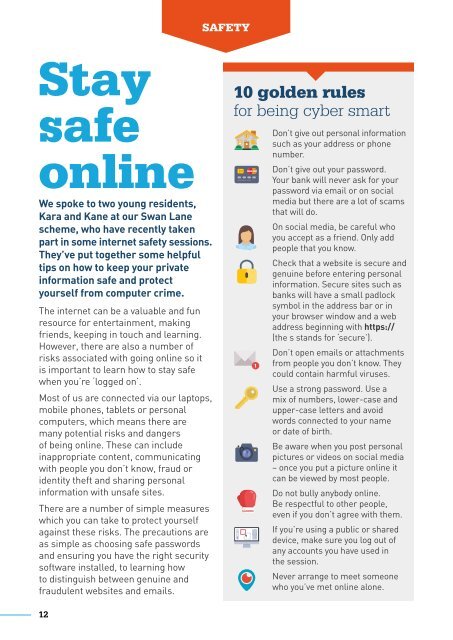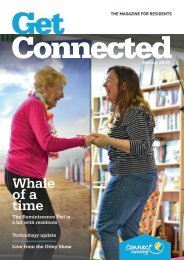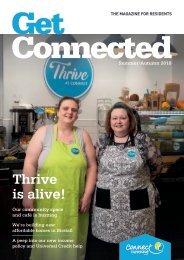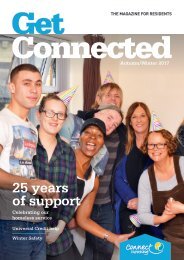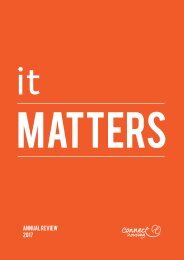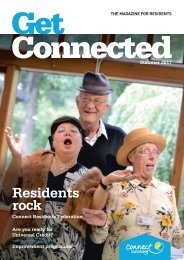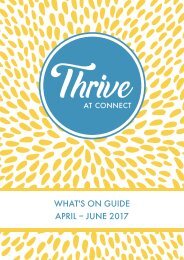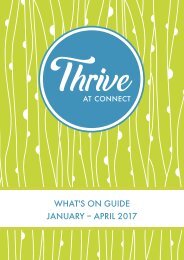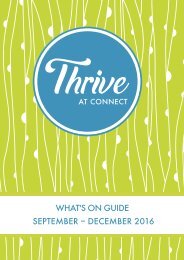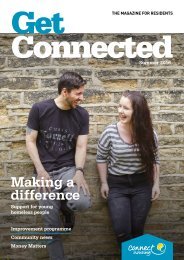Get Connected Spring 2017
Connect Housing's (charitable housing association in Yorkshire) tenant newsletter.
Connect Housing's (charitable housing association in Yorkshire) tenant newsletter.
Create successful ePaper yourself
Turn your PDF publications into a flip-book with our unique Google optimized e-Paper software.
SAFETY<br />
COMMUNITY<br />
Stay<br />
safe<br />
online<br />
We spoke to two young residents,<br />
Kara and Kane at our Swan Lane<br />
scheme, who have recently taken<br />
part in some internet safety sessions.<br />
They’ve put together some helpful<br />
tips on how to keep your private<br />
information safe and protect<br />
yourself from computer crime.<br />
The internet can be a valuable and fun<br />
resource for entertainment, making<br />
friends, keeping in touch and learning.<br />
However, there are also a number of<br />
risks associated with going online so it<br />
is important to learn how to stay safe<br />
when you’re ‘logged on’.<br />
Most of us are connected via our laptops,<br />
mobile phones, tablets or personal<br />
computers, which means there are<br />
many potential risks and dangers<br />
of being online. These can include<br />
inappropriate content, communicating<br />
with people you don’t know, fraud or<br />
identity theft and sharing personal<br />
information with unsafe sites.<br />
There are a number of simple measures<br />
which you can take to protect yourself<br />
against these risks. The precautions are<br />
as simple as choosing safe passwords<br />
and ensuring you have the right security<br />
software installed, to learning how<br />
to distinguish between genuine and<br />
fraudulent websites and emails.<br />
10 golden rules<br />
for being cyber smart<br />
Don’t give out personal information<br />
such as your address or phone<br />
number.<br />
Don’t give out your password.<br />
Your bank will never ask for your<br />
password via email or on social<br />
media but there are a lot of scams<br />
that will do.<br />
On social media, be careful who<br />
you accept as a friend. Only add<br />
people that you know.<br />
Check that a website is secure and<br />
genuine before entering personal<br />
information. Secure sites such as<br />
banks will have a small padlock<br />
symbol in the address bar or in<br />
your browser window and a web<br />
address beginning with https://<br />
(the s stands for ‘secure’).<br />
Don’t open emails or attachments<br />
from people you don’t know. They<br />
could contain harmful viruses.<br />
Use a strong password. Use a<br />
mix of numbers, lower-case and<br />
upper-case letters and avoid<br />
words connected to your name<br />
or date of birth.<br />
Be aware when you post personal<br />
pictures or videos on social media<br />
– once you put a picture online it<br />
can be viewed by most people.<br />
Do not bully anybody online.<br />
Be respectful to other people,<br />
even if you don’t agree with them.<br />
If you’re using a public or shared<br />
device, make sure you log out of<br />
any accounts you have used in<br />
the session.<br />
Never arrange to meet someone<br />
who you’ve met online alone.<br />
Made for men of all ages, Evolve is a new way<br />
of getting active and trying something different.<br />
Find out more on pages 14-17 >>><br />
12 13


